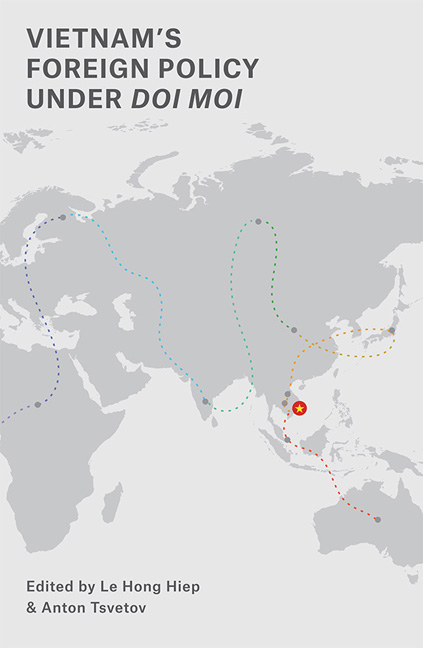Book contents
- Frontmatter
- Contents
- List of Tables
- List of Figures
- List of Abbreviations
- Acknowledgements
- About the Contributors
- PART I ANALYTICAL AND HISTORICAL FRAMEWORK
- PART II BILATERAL RELATIONSHIPS
- PART III MAJOR FOREIGN POLICY ISSUES
- 10 Vietnam's South China Sea Strategy since 2007
- 11 Vietnam's International Economic Integration under Doi Moi
- 12 Norm Diffusion through Trade: The Case of the EU–Vietnam Free Trade Agreement
- Index
12 - Norm Diffusion through Trade: The Case of the EU–Vietnam Free Trade Agreement
from PART III - MAJOR FOREIGN POLICY ISSUES
Published online by Cambridge University Press: 04 July 2018
- Frontmatter
- Contents
- List of Tables
- List of Figures
- List of Abbreviations
- Acknowledgements
- About the Contributors
- PART I ANALYTICAL AND HISTORICAL FRAMEWORK
- PART II BILATERAL RELATIONSHIPS
- PART III MAJOR FOREIGN POLICY ISSUES
- 10 Vietnam's South China Sea Strategy since 2007
- 11 Vietnam's International Economic Integration under Doi Moi
- 12 Norm Diffusion through Trade: The Case of the EU–Vietnam Free Trade Agreement
- Index
Summary
The current chapter aims to assess how the Government of Vietnam, as a norm recipient, responds to political, economic and social norms diffused through the European Union (EU)–Vietnam Free Trade Agreement (EUVFTA) negotiations.
As Manners (2009) suggests, the EU should be regarded as a normative power that works mainly through ideas and values rather than pure military or economic force. The notion of normative power in world politics indicates a separate form of engagement different from the conventional forms described by neo-realist and neo-liberal theories (Manners 2009). In this context, the concept of Normative Power Europe (NPE), which stems from a unique combination of “historical context, hybrid polity and legal constitution” of the EU (Manners 2002, pp. 240–41), could be regarded as a working approach that grasps the Union's distinctive features, determines, guides and legitimizes its international role (Diez 2005). At the same time, some scholars argue that the EU's role as a normative power should be explored in the field of trade policy because trade is an important source of EU power, and trade policy is its oldest and most “communitarized” external policy area (see, for example, De Zutter and Toro 2008; Leeg 2014; Orbie 2011; Sicurelli 2015).
Since the NPE concept has mainly been developed in the field of EU studies, analyses of the EU's normative power tend to concentrate on norm makers in Brussels, which makes it “Euro-centric” (Gerrits 2009, p. 2). Some studies suggest that apart from the EU's limited material and coercive power and institutional complexity, other countries’ contexts and positions on European norms might also constrain the efficiency of European normative power (Börzel and Risse 2012; Garcia and Masselot 2015). However, these explanatory factors have been underresearched. According to Ringmar (2012, p. 19), the reaction of other countries is “far more important than the action itself and their reaction is what the exercise of power ultimately seeks to influence”.
- Type
- Chapter
- Information
- Vietnam's Foreign Policy under Doi Moi , pp. 260 - 280Publisher: ISEAS–Yusof Ishak InstitutePrint publication year: 2018

